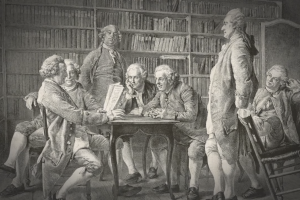A Philosophical Romance
WOMEN, EDUCATION AND ENLIGHTENMENT
Thomas Day (1748-1789) was a member of the Lunar Society, but he was less mechanically or scientifically inclined than his colleagues.
Influenced by the ideas of Jean-Jacques Rousseau (1712-1778), he embarked on the most unusual experiment of all the Lunar men, not in the realms of science and technology, but to acquire and educate a young girl to become his wife.
‘The whole of education of women,' wrote the Genevan philosopher, Jean-Jacques Rousseau in his 1762 educational treatise, Émile, ‘ought to relate to men.’ The anatomical and physiological medical discoveries of the Enlightenment revealed that men and women were formed differently. Female skeletons were smaller and specifically designed to bear children, their nervous systems were different and their brains were smaller, which seemed to prove women’s naturally ordained role as wife and mother.
However, Rousseau elevated this domestic role and attributed to it a new importance; women might be destined for the home, but their role within it was vitally important as companions to their husbands and educators of their children.
In Émile, Rousseau outlined a new system of child-rearing that allowed children to learn from experience, away from fashionable society. For girls, because nature had ordained them as companions for men, this education restricted them to the home and learning of their conjugal and maternal duties.
KEYWORDS: Thomas Day, Enlightenment, Lunar Society, Women, Lunar Men, Lunar Women, Education, Rousseau, Sabrina Sidney, Anna Seward, Lichfield
Download the Full Article (PDF)Categories:
